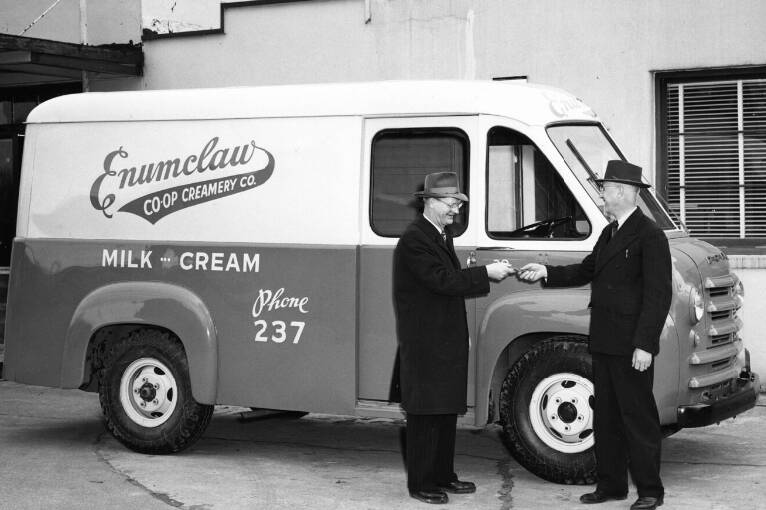When I was a child in the 1950s, my family would journey back to my dad’s childhood home in western Montana, northwest of the small town of Ronan, each summer. My grandfather was a rancher, but he also had milk cows that he used to supply his family with milk, cream, and butter. In the covered porch at their back door, they had a cream separator. You poured the raw milk into a receptacle on top, and somehow the machine separated the cream from the milk.
This was little different for farmers in the 1890s in rural south King County. Swedes, Danes, Germans, and Norwegian immigrants went a step further than my grandparents. They were very influential in creating cooperatives in Enumclaw. These collectively owned enterprises imitated what they had gotten used to in Europe over hundreds of years. Two examples were the Farmers’ Mutual Insurance Company founded in 1898, which eventually evolved into Mutual of Enumclaw. They also created the Enumclaw Cooperative Creamery in 1899.
Farmers were owners of the cooperative. They bought shares in it: Every one of their cows cost them $2. The combined money helped to provide cream separators and other machinery to produce butter, which was the main product in the creamery’s early startup. According to history.com, Clarence Bagley, the author of The History of King County, “credits Enumclaw with the distinction of having more cooperatives than any other community in the Pacific Northwest.”
Hop production, which had been the major cash crop in the 1880s, was wiped out by the 1890s with a hop blight. Farmers had to switch to dairy production to survive. As time passed, sweet cream was added. Enumclaw’s cream became the standard of quality throughout the entire Puget Sound region. The cooperative began with 60 farmers and increased to about 1,100 by 1949 (Heritage of 50,000 Dairymen).
In this early period, farmers brought their milk and farm-separated cream in horse-drawn wagons. The cans were not refrigerated, meaning that on warm summer days, their dairy products often turned sour before reaching the co-op, resulting in lost profits.
By 1949, there were two dairy plants, one in Enumclaw, which pasteurized the sweet cream and roller powder, and also made butter. The receiving plant at Yelm handled fresh milk and cream and processed ice cream mix. The annual business that year produced $2.5 million in products. Half of the grade A milk was sent to Tacoma, Seattle, and Fort Lewis. The other half was sold as sweet cream or manufactured into premium priced Darigold butter. (Heritage)
The first cooperative, made out of wood, burned to the ground in October 1901. It was replaced in February 1902 with a concrete building built across the street from the Kettle Restaurant on what is now Garrett Street.
In 1915, the Enumclaw Creamery won a gold medal for its dairy products at the Panama Exposition in San Francisco. That made Enumclaw Creamery’s products world famous. (Nancy Irene Hall, “In the Shadow of the Mountain” 2004 edition: p. 274)
In 1922, the co-op was enlarged. By 1927, refrigeration facilities were increased as demand grew. A Courier-Herald article of Aug. 11, 1939 stated that “a fleet of 17 trucks were [sic] by this time collecting from the creamery patrons and that cash volume reaching $1,027,000 involving some 2 million pounds of butterfat had been reached.”
Beginning in 1950 the co-op began delivery services to stores and consumers. A new delivery truck was purchased to accommodate the routes. Those routes were purchased by the Creamery from Smith Brothers of Kent. As a result of this purchase, the Yelm plant was converted into a manufacturing unit where most of the butter, ice cream mix, and condensed milk was processed. The Enumclaw plant then produced Grade A milk and cream, and buttermilk. Chocolate and orange drinks were sold and distributed along the Enumclaw route and two newly purchased routes in Yelm (“Oldest Co-Op Creamery was started here in 1899.” Enumclaw Courier-Herald, Nov. 23, 1950).
But just a year later on Dec. 6, 1951, it was announced in the Enumclaw Courier Herald that the Enumclaw Co-Operative Creamery Company had sold its retail milk business both in Enumclaw and Yelm. Reasons for the sale came as a result of “ever-increasing operating costs, together with the fact that the area in which the routes were operated was not large enough to warrant the expense involved….” Ownership of the [Enumclaw] Dairy enterprise shifted to two companies: Randall and Pozzi of Kent and the Smith Brothers Dairy, also of Kent.
The Enumclaw plant continued to operate under the Smith Brothers label, but eventually, the plant closed, sitting vacant for a number of years until it was torn down in the 1980s.
Like Farman’s Pickles, the Creamery Company was bought out by bigger firms, and then disappeared, leaving only the buildings themselves. It’s a story of small-town companies that were once successful but died out due to changes over time.


